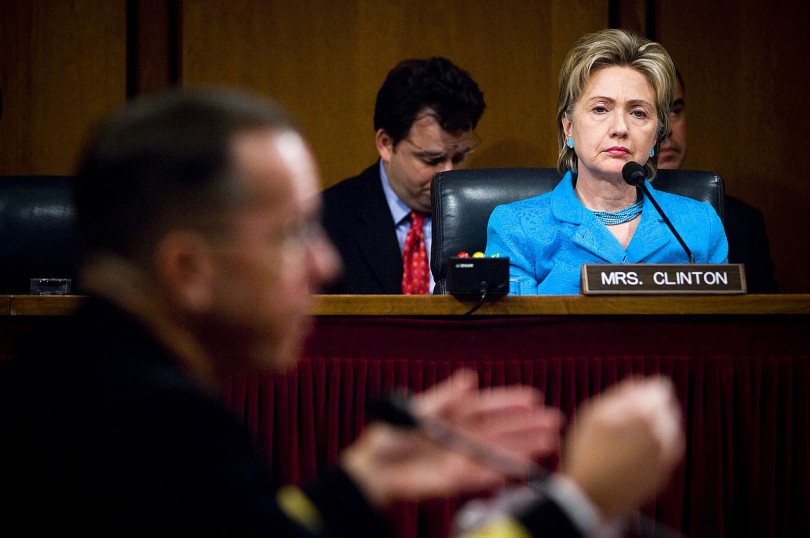aNewDomain — Over the weekend, the CIA dropped a bombshell on the Republican-led congressional panel’s inquiry of Hillary Clinton and her treatment of email while she was U.S. Secretary of State. The agency now says the disputed emails did not contain classified information harmful to the interests of the nation’s national security.
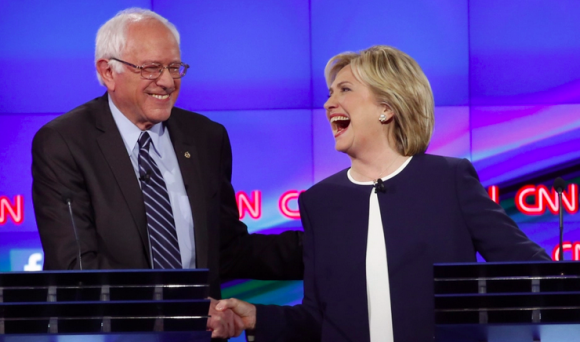 The issue has been highlighted by media and the Republican party for months and used to smear Clinton’s current presidential run. It was discussed during last week’s Democratic presidential debates and, in a non-political move, U.S. Senator Bernie Sanders (I-VA) backed Clinton on the issue, saying:
The issue has been highlighted by media and the Republican party for months and used to smear Clinton’s current presidential run. It was discussed during last week’s Democratic presidential debates and, in a non-political move, U.S. Senator Bernie Sanders (I-VA) backed Clinton on the issue, saying:
Let me say something that may not be great politics, but I think the secretary is right. The American people are sick and tired of hearing about your damn emails.”
About Those Emails …
The email dispute arises from Clinton’s days as Secretary of State. She established a private, unsecured email server at her New York state residence to carry out business for the State Department. The emails included transmissions of confidential information, sent from her handheld device, regarding insider information about international events. The Inspector General’s subsequent investigation pulled a random sample of forty emails from Clinton’s home server, and discovered that four of the emails from their sample included “classified” information.
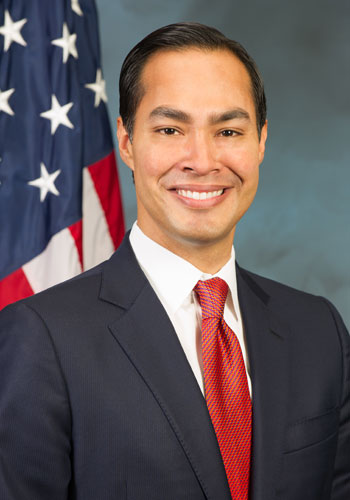 Julian Castro, the head of the Department of Housing and Urban Development, defended Clinton back in May. He said,
Julian Castro, the head of the Department of Housing and Urban Development, defended Clinton back in May. He said,
What you have with these emails is basically a witch hunt … Congress and others have conducted various investigations into the Benghazi tragedy and found no wrong doing on [Clinton’s] part.”
However, after initially declaring what she did was lawful, Clinton has since apologized to the public.
Despite all this, the congressional panel against Clinton has come under fire in light of this weekend’s developments.
CIA “Shrugs Off” Republicans Claims of Treason And Dereliction of Duty
On Saturday, October 17, the authenticity of the politically-driven inquiry fell into serious doubt when the CIA “shrugged off” the emails. The March 8, 2011 email in dispute was exchanged between Clinton and her close friend and advisor Sidney Blumenthal. It contained the “name of a human source” of a Libyan connection with the CIA. The committee chairman, Rep. Trey Gowdy (R-S.C.) declared this email as, “… some of the most protected information in our intelligence community, the release of which could jeopardize not only national security but human lives.”
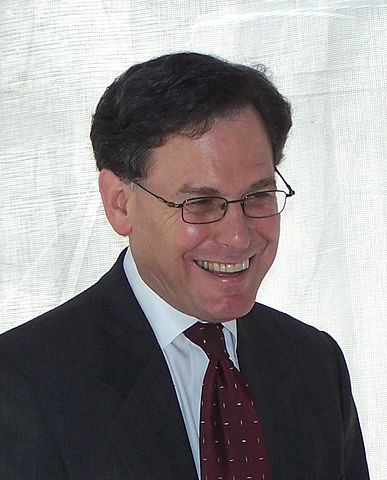 CIA officials do not view the March email — or any of the cited 127 emails between Clinton and Blumenthal — to constitute classified information requiring redaction in breach of federal espionage statutes. The CIA also believes that Gowdy altered documents that he provided to the Select Committee on Benghazi in order to frame and further damage Clinton’s reputation.
CIA officials do not view the March email — or any of the cited 127 emails between Clinton and Blumenthal — to constitute classified information requiring redaction in breach of federal espionage statutes. The CIA also believes that Gowdy altered documents that he provided to the Select Committee on Benghazi in order to frame and further damage Clinton’s reputation.
Rep. Elijah E. Cummings, the Ranking Member of the House Select Committee on Benghazi, sent a letter to Gowdy in order to correct the public record and note Gowdy’s misinformed accusations. Cummings wrote:
The problem with your accusation—as with so many others during this investigation—is that you failed to check your facts before you made it, and the CIA has now informed the Select Committee that you were wrong. I believe your accusations were irresponsible, and I believe you owe the Secretary an immediate apology.”
Despite the pass that Clinton received in the presence of her political peers, most media outlets, the CIA, and even in front of the Republican Ranking Member of the Committee on Benghazi, her reputation and subsequent run for president may be damaged. The issue is a distractive red herring and, in light of former high-level espionage targets who have suffered worse fates for the same or similar conduct, Clinton’s reputation will permanently be called into question.
Gallery of Former Espionage Act Targets
In the matter of government whistleblowers, former NSA contractor Edward Snowden and former NSA executive Thomas Drake faced charges of violations of the Espionage Act.
Snowden, the former CIA employee and government contractor who in 2013 leaked classified information from the NSA, created a tempest of privacy and security issues and, ultimately, fled the United States. While some say he has been vindicated, he remains at large in Russia.
Drake, on the other hand, challenged the Department of Justice (DOJ) and faced his charges under the Espionage Act. His concerns about wasteful government spending at the NSA and the government’s surveillance program involved the Trailblazer Project and the Thinthread Project. Like Snowden, Drake was charged for violations of the Espionage Act, which can carry the death penalty. The charges against Drake were later dropped, but he pled to a misdemeanor of misusing a computer.
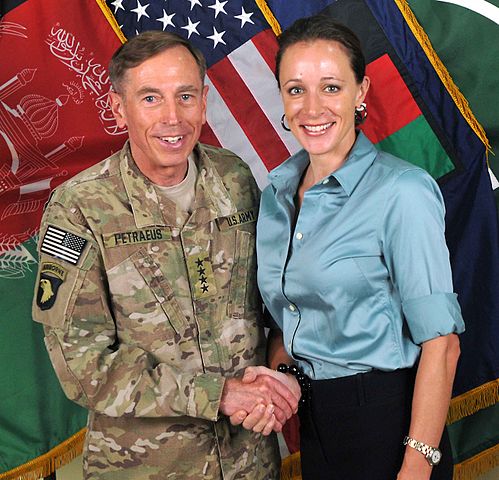 Another in the gallery is Army General David Petraeus, who received a sentence of two years probation and was imposed a $100,000 fine in March 2015 for violation of the statute for transferring classified documents to his biographer (and lover) Paula Broadwell.
Another in the gallery is Army General David Petraeus, who received a sentence of two years probation and was imposed a $100,000 fine in March 2015 for violation of the statute for transferring classified documents to his biographer (and lover) Paula Broadwell.
Some form of punishment is common, even if prison is off the table. Drake recently commented on Clinton’s lack of punishment, saying that there is the law for the average citizen, and a different one for the powerful. He said, sarcastically, “But hey, I’m secretary of state … Even Obama gave her cover.”
Ron Hosko, president of the Law Enforcement Legal Defense Fund and former FBI special agent, blasted the president’s statements on 60 Minutes on October 10, in which he said that Clinton made a “mistake” with the emails and the issue has been “ginned up” to foment controversy. Hosko insists that the president should refrain from using executive intervention and “from suggest[ing] what side of the investigation he is on” while the FBI investigation is still underway.
Hosko continued,
Injecting politics into what is supposed to be a fact-finding inquiry leaves a foul taste in the FBI’s mouth and makes them fear that no matter what they find, the Justice Department will take the president’s signal and not bring a case.”
However, these claims appear to be “the pot calling the kettle black,” considering the unauthorized routine swapping of classified information between federal agencies referred to as parallel construction.
In Clinton’s case, according to a FoxNews’s confidential “intelligence source,” the FBI is reportedly focusing on the subsection involving “gross negligence” in her guardianship of highly classified information. According to federal regulations (18 C.F.R. 3a.11), “classified” information refers to “national security information or material which … its unauthorized disclosure could reasonably be expected to cause exceptionally grave damage to the national security.”
The Fox News’ intelligence source specifically cites 18 U.S.C. § 793(f), relating to “Gathering, Transmitting or Losing Defense Information” which states:
Whoever, being entrusted with or having lawful possession or control of any document … or information, relating to the national defense, (1) through gross negligence permits the same to be removed from its proper place of custody or delivered to anyone in violation of his trust, or to be lost, stolen, abstracted, or destroyed, or (2) having knowledge that the same has been illegally removed from its proper place of custody or delivered to anyone in violation of its trust, or lost, or stolen, abstracted, or destroyed, and fails to make prompt report of such loss, theft, abstraction, or destruction to his superior officer — Shall be fined under this title or imprisoned not more than ten years, or both.” (Emphasis added.)
As further support, the Fox News source emphasized that a violation of the statute may occur even if the information is not classified and added that the “subsection requires the ‘lawful possession’ of national defense information by a security clearance holder who ‘through gross negligence,’ such as the use of an unsecure computer network, permits the material to be removed or abstracted from its proper, secure location.”
In this same vein, according to last week’s Free Republic analysis of the statute, its political commentator observed,
It seems beyond dispute that Hillary had possession or control of documents relating to the national defense. Indeed, some of her documents have been designated as ‘originally classified’ which means, by definition, that their disclosure ‘reasonably could be expected to cause damage to the national security.'”
The commentator further argued that having the information on a private unsecured server at her residence in Chappaqua, New York, rather than at the highly secured compound at the State Department, violates the statute because the data has been removed from its proper place of custody at the office and the information was subsequently transmitted to someone else, referring to Sidney Blumenthal, who apparently doesn’t have security clearance. The problematic email exchange on November 10, 2011, between Clinton and Blumenthal, referred to the “Blair option,” presumably relating to the Israel-Palestinian peace process.
Because the information is classified this means that its unauthorized disclosure carries a “presumption” or reasonable expectation of damage to national security.
Finally, Free Republic claims, as did the Fox News source, that the intrinsic risk posed by hackers penetrating the firewall constitutes a breach of national security. Reference is also made to President Obama’s comments in a CBS interview with Steve Kroft that there was never any “national security problem” with Clinton’s use of a private server to review her emails.
As a legal matter, Clinton detractors frame the issue not as one of Clinton using a private server containing confidential information as posing a national security threat — rather that Clinton was grossly negligent for removing the information from its original place of storage at the office and then transmitting via email this information from her private server to one of her aids in the discussion of Middle Eastern peace negotiations.
Unprecedented Use of The Espionage Act for Political Purposes
However, this all seems very mistaken and absurd to suggest that Clinton is consorting with the enemy, imperiling national security or compromising sensitive data to the media as a whistleblower. The act is notoriously ambiguous and prone to numerous and conflicting interpretations, and there is a dearth of case law construing the statute in the same fashion as Fox News’ “confidential” source or the analyst with Free Republic.
The legislative intent of § 793(f) deals with unauthorized transmission of classified information to enemies of the United States. Contrary to her opponents’ assertions, it does not prohibit unauthorized receipt from a member of Clinton’s inner diplomatic circle during Middle East peace talks, which involves making peace rather than inciting war.
In other words, Clinton has not transferred confidential or classified data to any foreign agent or Communist, and there is no statutory provision that precludes her from working from home on her personal server containing sensitive information requiring specific authorization from her superiors.
For aNewDomain, I’m Jim Kelly.
Images in order: Hillary Clinton in 2007 at Senate Armed Services Committee; Bernie and Hillary Democratic Debate courtesy CNN Live Stream; Julian Castro via Wikimedia Commons; Sidney Blumenthal via Wikimedia Commons; David Petraeus and Paula Broadwell in 2011 via Wikimedia Commons.

